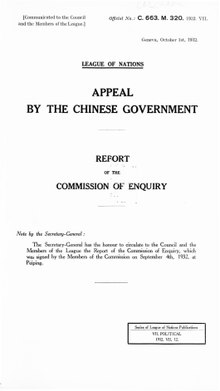
The Lytton Report (リットン報告書, Ritton Hōkokusho) refers to the findings of the Lytton Commission, entrusted in 1931 by the League of Nations in an attempt to evaluate the Mukden Incident, which was used to justify the Empire of Japan's seizure of Manchuria.
The five-member commission, headed by British politician Victor Bulwer-Lytton, announced its conclusions in October 1932. It stated that the Empire of Japan must withdraw from Manchuria, recognized Chinese sovereignty of Manchuria, and refused to recognize the Japanese puppet state of Manchukuo.[1][2] The League of Nations General Assembly adopted the report, and Japan quit the League. The recommendations went into effect after Japan surrendered in World War II in 1945.
- ^ “League of Nations Assembly Report on the Sino-Japanese Dispute.” The American Journal of International Law, vol. 27, no. 3, 1933, pp. 119–53. JSTOR, https://doi.org/10.2307/2213489. Accessed 28 July 2024.
- ^ Hudson, Manley O. “The Report of the Assembly of the League of Nations on the Sino-Japanese Dispute.” The American Journal of International Law, vol. 27, no. 2, 1933, pp. 300–05. JSTOR, https://doi.org/10.2307/2189554. Accessed 28 July 2024.